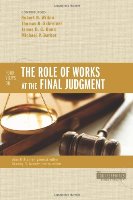About the Editor
Alan P. Stanley is Lecturer in Biblical Studies at Brisbane School of Theology, Brisbane Australia. He has published two books on the subject of salvation, faith, and works.
Introduction
This addition to the Counterpoints series considers the relationship between faith and works at the final judgment. The New Testament teaches that believers are justified by grace through faith, but also that believers are judged by their works. These twin teachings have generated different theological syntheses, and resulted in significant debates. In this book representatives from four perspectives present an essay arguing for their personal view, and also respond to the essays of their fellow contributors.
Robert Wilkin represents the perspective of the Grace Evangelical Society, and argues that good works are not necessary for eternal life. When believers are judged on the basis of their works, it is for rewards: their eternal destiny is sealed the moment they profess faith in Christ.
Thomas Schreiner argues from a Calvinistic perspective that believers are justified by faith alone, but saving faith is always accompanied by good works. As a result, the presence of works is evidence of the presence of saving faith. Where there are no works, there is no faith.
James Dunn approaches the issue from the broad framework of covenantal nomism, but also with an eye to the diversity of New Testament data that informs the topic. He argues that Paul has different emphases in different contexts, but Paul never offers a systematic harmonization. We need to hold to a united theology that does not clip the real diversity of the texts.
Michael Barber argues from Catholic theology that all human works are owing to the grace of God, but by virtue of union with Christ, God does the impossible and makes our works meritorious. He insists that Catholicism does not teach works-righteousness, but actually has the highest view of the role of God’s grace in our salvation and works.
Table of Contents
Introduction
(Alan P. Stanley)
Chapter 1
Christians Will be Judged According to Their Works at the Rewards Judgment, But Not at the Final Judgment
(Robert N. Wilkin)
Chapter 2
Justification Apart From and by Works: At the Final Judgment Works Will Confirm Justification
(Thomas R. Schreiner)
Chapter 3
If Paul Could Believe Both in Justification by Faith and Judgment According to Works, Why Should that be a Problem for Us?
(James D. G. Dunn)
Chapter 4
A Catholic Perspective: Our Works are Meritorious because of our Union with Christ by Grace
(Michael P. Barber)
The Puzzle of Salvation by Grace and Judgment by Works
(Alan P Stanley)
Scripture Index
Subject Index
Book Summary
Chapter 1
Christians Will be Judged According to Their Works at the Rewards Judgment, But Not at the Final Judgment
(Robert N. Wilkin)
The witness of the New Testament is that salvation is entirely by the grace of God. There are no conditions attached to receiving eternal life by faith. Works are not necessary for salvation. The Gospel of John – the NT book that is explicitly written with evangelistic intent – clearly says that everyone who believes has eternal life: there are no conditions attached for good works or perseverance. When believers are judged for their works it has nothing to do with their eternal destiny.
Judgment for works is exclusively about
[To continue reading this summary, please see below....]The remainder of this article is premium content. Become a member to continue reading.
Already have an account? Sign In
